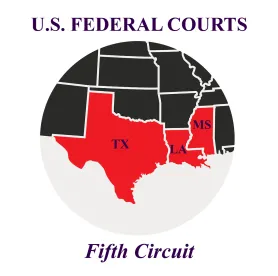The U.S. Court of Appeals for the Fifth Circuit recently ruled that prohibitions against discriminatory employment practices against the LGTBQ+ community under Title VII of the Civil Rights Act of 1964 are inapplicable to religious, private, for-profit companies that possess sincere, religious objections to gender nonconforming conduct.
Quick Hits
-
The Fifth Circuit held that a private commercial business with sincere religious beliefs against gender-nonconforming conduct is exempt from Title VII of the Civil Rights Act of 1964.
-
The ruling found that despite the Supreme Court’s holding that Title VII prohibits discrimination based on sexual orientation, prohibiting such discrimination is not a sufficiently compelling interest to override religious liberty in all cases.
In Braidwood Management v. Equal Employment Opportunity Commission, a panel for the Fifth Circuit held that a Christian-owned wellness center is exempt from Title VII because compliance would “substantially burden” its “religious beliefs about homosexual and transgender conduct.” The ruling, which was released on June 20, 2023, comes after the Supreme Court of the United States in its 2020 decision in Bostock v. Clayton County held that Title VII forbids discrimination based on sexual orientation as a form of discrimination “on the basis of sex.”
The court further found that the U.S. Equal Employment Opportunity Commission (EEOC) failed to show a “compelling interest” in refusing to recognize a religious exemption in enforcing Title VII to prohibit discrimination based on sexual orientation.
At the same time, the appellate court rejected class certification for all employers that oppose “homosexual or transgender behavior for religious or nonreligious reasons” and “church-type employer[s],” limiting its ruling to the individual claims.
The decision focused on the relationship between the Religious Freedom Restoration Act of 1993 (RFRA)—which prohibits the government from “substantially burdening” a person’s exercise of religion—and Title VII.
Background
Braidwood Management Inc., which owns a wellness center and other businesses, and Bear Creek Bible Church, both of Texas, filed suit against the EEOC seeking a declaration that their policies did not violate Title VII. According to the decision, Braidwood enforces a policy requiring employees to wear clothes that conform with their “biological” gender, and Braidwood’s owner, who seeks to run his companies as “Christian” businesses, does not permit the hiring of people who exhibit nonheterosexual or gender nonconforming behavior, because of sincerely held religious beliefs. Bear Creek is a nondenominational Christian church that similarly does not hire people who exhibit nonheterosexual or gender nonconforming behavior. Both entities restrict bathroom usage by biological sex.
Since the policies violate current EEOC guidance, Braidwood and Bear Creek sought a ruling to affirm the legality of their policies, arguing that EEOC guidance following the Bostock decision prevents them from operating compatibly with their religious beliefs. They also sought a ruling to confirm that Title VII does not prohibit similarly situated employers from banning the employment of LGTBQ+ people.
The district court sided with Braidwood and separated the claims of Bear Creek into a “church-type employers’ class,” which the court found was statutorily exempt from Title VII.
Substantial Burden on Religious Beliefs
The Fifth Circuit found that challengers had standing, but rejected certification of the class claims. Still, the court agreed that Braidwood is exempt from Title VII based on the RFRA. The court stated that “[b]eing forced to employ someone to represent the company who behaves in a manner directly violative of the company’s convictions is a substantial burden and inhibits the practice of Braidwood’s beliefs.” The court stated that the EEOC’s position that Braidwood may not take adverse employment actions against individuals based on their sexual orientation would require the company “to comply wholeheartedly with the guidance it sees as sinful.”
As the Fifth Circuit further explained, the RFRA places the burden on the government to prove in the face of a sincerely held religious belief there is a “compelling interest in [nonetheless] applying [Title VII] to” employers whose “sincere exercise of religion is being substantially burdened.” The court stated that the EEOC failed to carry this burden, at least as to Braidwood, noting that the Supreme Court has never held that preventing businesses from discriminating based on sexual orientation or gender identity “overrides religious liberty in all cases.”
Next Steps
On its face, the Braidwood ruling means private, religious employers within the Fifth Circuit, that sincerely believe all people should be heterosexual or cisgender, can enforce anti-LGTBQ+ policies without violating Title VII, unless or until the EEOC can articulate a compelling reason why Title VII’s protections trump the employers’ sincerely held beliefs, as required by the RFRA.





 />i
/>i

